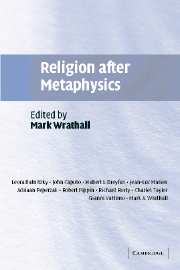Book contents
- Frontmatter
- Contents
- List of contributors
- Preface
- 1 Introduction: metaphysics and onto-theology
- 2 Love and death in Nietzsche
- 3 After onto-theology: philosophy between science and religion
- 4 Anti-clericalism and atheism
- 5 Closed world structures
- 6 Between the earth and the sky: Heidegger on life after the death of God
- 7 Christianity without onto-theology: Kierkegaard's account of the self's movement from despair to bliss
- 8 Religion after onto-theology?
- 9 The experience of God and the axiology of the impossible
- 10 Jewish philosophy after metaphysics
- 11 The “end of metaphysics” as a possibility
- Index
7 - Christianity without onto-theology: Kierkegaard's account of the self's movement from despair to bliss
Published online by Cambridge University Press: 21 May 2010
- Frontmatter
- Contents
- List of contributors
- Preface
- 1 Introduction: metaphysics and onto-theology
- 2 Love and death in Nietzsche
- 3 After onto-theology: philosophy between science and religion
- 4 Anti-clericalism and atheism
- 5 Closed world structures
- 6 Between the earth and the sky: Heidegger on life after the death of God
- 7 Christianity without onto-theology: Kierkegaard's account of the self's movement from despair to bliss
- 8 Religion after onto-theology?
- 9 The experience of God and the axiology of the impossible
- 10 Jewish philosophy after metaphysics
- 11 The “end of metaphysics” as a possibility
- Index
Summary
Kierkegaard belongs right after Mark Wrathall's eloquent explanation and defense of the later Heidegger's account of the fourfold: the local earth, the seasons, our mortality, and the remnants of the pagan gods. Wrathall presented the fourfold as an attempt to answer the question: Why do we need the divine and the sacred in our lives and how should we preserve and promote them?
If he had read Martin Heidegger, Kierkegaard would have answered that any attempt to preserve the local is doomed; that technicity, the drive toward optimization and efficiency, will sooner or later wipe out traditional practices, just as it has already wiped out the last stage of onto-theology, the metaphysics of the subject, and is turning us all into resources.
Heidegger was all too aware of this possibility, which he expresses in his lament that “the wasteland grows,” that what is so dangerous about technology is that it is a drive toward the total efficient ordering of everything. The wilderness is turning into a resource – the Alaskan resource, human beings are no longer personnel, but rather material for the Human Resources Departments, and a recent advertisement proclaimed that children “are our most precious resource.” What Robert Pippin called “farmer metaphysics” is on the way out. Heidegger sadly notes the television antennas on the peasants' huts and feels that we are already failing to dwell, and that our culture is rushing into the “longest night.”
- Type
- Chapter
- Information
- Religion after Metaphysics , pp. 88 - 103Publisher: Cambridge University PressPrint publication year: 2003
- 2
- Cited by



